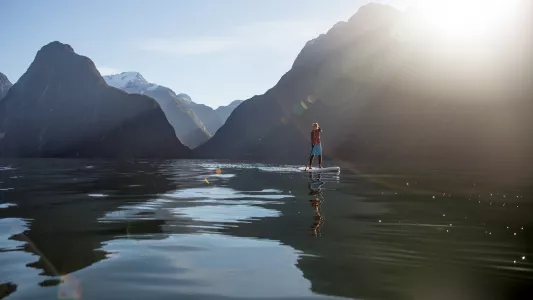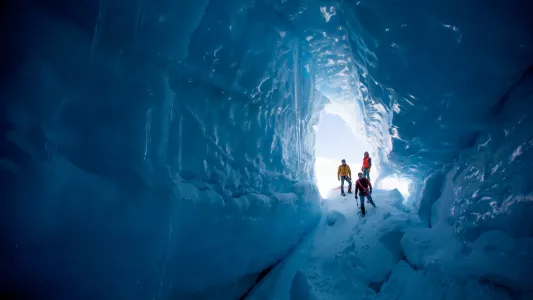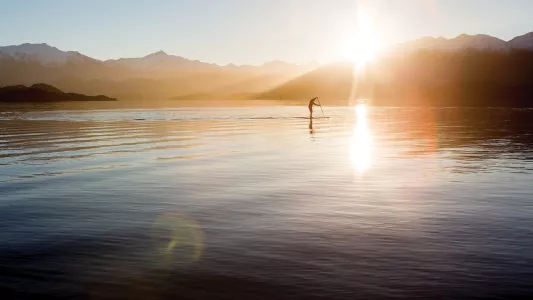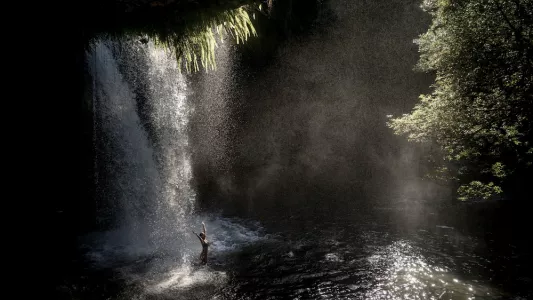"I absolutely love working with people from all over the world in outdoor environments, using natural light and mother nature to paint an authentic story full of awe and wonderment."
When you venture out into the wild for a hike up a mountain, a swim in a sheltered cove, or a run across a field, there begins a letting go of pressure built up over consecutive days, months, and years of stuff. The pressure is created by walls and harsh lights, and circling crowds. It can press you from all sides and mould you into a strained version of yourself, so when you look in the mirror, you have to rearrange your face to a more palatable mask of ease.
A sense of ease returns in those long moments when you take that first clean breath of fresh air on a new journey into the wild. There are so many wonders in the wild that attract our attention and have done for many, many years; those humbling views take your breath away and restore a sense of perspective you cannot find within four walls. We even have words to describe the specific attraction to the benefits of exploring wild spaces.
Friluftsliv (pronounced free-loofs-leef) is a Norwegian noun which refers to a way of slowly immersing yourself in nature; outdoor saunas, foraging for mushrooms or taking a stroll through the forest. It's about nurturing the soul with exposure to nature in your own time- no rushing, competing, or daring required. Just you and the vast expanses of green, red, and blue. [1]

In Iceland, there is a beautiful word for that broad horizon to-horizon panoramic view you find in the wild expanses; Víðsýni ( pronounced vith-see-nee), which can also mean open-mindedness or wide vision. This certainly reflects the feeling of expansive and unobstructed open tundras in the country and their incredible resourcefulness and innovation in sustainable development. [1a]
A huge expanse of the wild country open for your eye to sweep at leisure can do wonders for those struggling with anxiety and depression. 'What you see and how you see the world can have incredible impacts on your state of mind.' Dr Andrew Huberman. We will come back to this a little later to investigate what exactly is the effect of what you see, or more importantly, what you don't see, has on your wellbeing.
Finally, a romantic word Smultronställe (pronounced smull-ston-stellar), a Swedish word which refers to a 'small remote place where wild strawberries grow.' This not only refers to the literal place where you can find those sweet fruits. It also refers to a place you hold dear. This could be a particular pond in a local nature reserve, a waterfall in another country which you return to year after year, or a street corner; that makes you feel happy. [1b]
There are so many wonderful words to describe our world and our revelling in it. The reason? Because we benefit from wandering in the wild so much and taking in those humbling views of nature in her sublime terrible beauty.

In an interview on YouTube, Dr Andrew Huberman explains just why looking at a Víðsýni (panorama) can alleviate anxiety. It's all about our vision, "which is the strongest lever with which we can shift our mind and body." If we can expand our vision, we can change our state of mind; similarly, if we breathe deeply, we can soothe anxiety or panic. It's all connected! [2]
So when we seek out those beautiful wide spaces in the world and gaze across the expanses, stretching our vision to the max, we can relax. There are no emails popping up into our peripheries or walls interrupting our view- we feel like we are on top of the world- because that's what our eyes behold to be true.
Camilla Rutherford (@camillarutherford_photography)is a photographer who brings these top-of-the-world moments to us from all over the globe, from her childhood home in Scotland to Wanaka, New Zealand, where she is now based in the mountains with her partner, who is a high-country Merino sheep farmer.
For Camilla, we all need more than to dip in and out of nature; we need to be a part of its rhizome of life. Through her personal photography project about regenerative farming, Camilla has learnt a lot about the human connection to the land and what it means for our physical and mental health.
"As human animals," says Camilla, "we have begun to forget that we are part of nature; we are not separate from it. And there is something primal about that feeling of being out there on top of a mountain, skiing, biking or climbing, being out swimming in the ocean, rivers or lakes. Eating food foraged right from the ground. It makes all makes us human."

Camilla's work has taken her all over the world and enabled her to capture moments of human connection with nature as well as be a wife to a farmer and mother to her two sons. She talks with conviction about a change we all need to make, about this rush we are all living in, a current of life so divorced from nature.
"We all lead such busy lives," she says, "caught up in what we think is important, material positions, work, to pay for it. But when we slow down and stop and reconnect with what is actually important, people and our natural environment, it makes us feel good and cuts through all the blur of our busy lives. Remembering how nature doesn't rush, it has its own way of sorting things out, and we can be part of that if we choose. Remembering where our food comes from, how it is produced and ultimately how this makes us feel when we eat it, both physically and mentally."

References
[1] [1a] [1b] Hodges, Kate, Wild Words, (London, Portico, 2021)
[2] The Tim Ferriss Show. (2021, November 5th). How Panoramic Vision Can Reduce Your Stress and Anxiety [VIDEO]:




